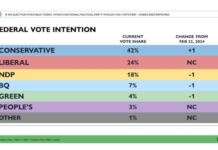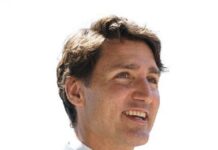BY BRUCE ANDERSON & DAVID COLETTO
Abacus Data
We just completed a national survey of 2,000 Canadian adults eligible to vote (August 17 to 22, 2021).
After the first week of the campaign, here’s what we are seeing:
Government Approval
Today, 41% approve of the job being done by the Trudeau government, while 42% disapprove. Regionally, net approval is +4 in BC, -36 in Alberta, -22 in Saskatchewan and Manitoba, +3 in Ontario, +11 in Quebec, and +7 in Atlantic Canada.
Desire For Change
At the time of the 2019 election, 69% wanted change including 52% who felt strongly about it. Today, 71% want change, which includes 44% who feel strongly about it. The desire for change hasn’t changed much in the past week.
Leader Impressions
Liberal Leader Justin Trudeau enjoys a positive impression among 39% and negative impressions among 42%, for a net score of -3. This is unchanged from last week. Regionally, Trudeau is +2 in BC, -41 in Alberta, -21 in SK/MB, 0 in Ontario, +9 in Quebec, and +11 in Atlantic Canada.
NDP Leader Jagmeet Singh enjoys a positive impression among 42% and finds negative impressions among 24% for a net score of +18. Positive impressions of Mr. Singh are up slightly in the last week (+3). Regionally, Mr. Singh’s is +34 in BC, +3 in AB, +23 in SK/MB, +18 in Ontario, +10 in Quebec, and +22 in Atlantic Canada.
Conservative Leader Erin O’Toole’s image has improved over the past week. Today, 26% have a positive impression of the Conservative leader (+5) while his negatives remain at 41% for a net score of -15. Regionally, Mr. O’Toole is -20 in BC, +1 in AB, -14 in SK/MB, -16 in Ontario, -15 in Quebec, and -7 in Atlantic Canada.
In terms of whether people’s views are improving or declining of the three main party leaders, we find Mr. Trudeau has the lowest momentum score while Mr. Singh has the highest.
Federal Vote Intention
If the election were today:
• The Liberals would win 33% of the vote (unchanged from last week, and the same result they got in 2019)
• The Conservatives would garner 29% (+1 from last week but still down 5 from their 2019 result)
• The NDP would get 23% of the vote (+1 over the week, and 7-points above their 2019 result)
• The Green Party would find 3% support (-2 in a week and down 4 from 2019)
• The BQ at 29% in Quebec (down 2 from last week down 3 from their 2019 result)
The regional races look like this:
• In BC, we see the Liberals at 33%, the NDP at 31% and the Conservatives at 28%. The Greens are at 7%.
• In Alberta, 45% would vote Conservative, 30% for the NDP, 15% for the Liberals, and 5% for the People’s Party.
• In Manitoba and Saskatchewan, the Conservatives lead by 9 over the NDP and Liberals.
• In Ontario, the Liberals lead by 6 (36% to 29% for the Conservative Party) with the NDP close behind at 26%. The People’s Party is at 5% in Ontario.
• In Quebec, we see the Liberals with 35%, followed by the BQ (29%), the Conservatives (19%) the NDP at 11%. The Greens are at 3% in Quebec.
• In the Atlantic provinces, the Liberals (45%) are well ahead of the Conservatives (32%) and the NDP (16%).
Vote By Those Who Say They Definitely Will Vote
Among the 72% of respondents who said they would definitely be voting, the Liberals and Conservatives are tied at 31% with the NDP at 22%. The BQ is at 7%, the People’s Party at 4%, and the Greens at 3%.
Open to Changing Mind?
Right now, 60% of decided voters say they have made up their mind and won’t change while 40% say they could still change their mind about who to vote for.
About two-thirds of Conservative, BQ, and Liberal supporters say their mind is made up (69%, 67%, and 63%), while less than half of NDP (47%) and Green (42%) supporters say they are locked into their choice.
Among those who are firm in their choice, the vote split is 34% Liberal, 34% Conservative, and 18% NDP.
It’s clear many current NDP and Green supporters are still up for grabs. Among these soft NDP and Green supporters, 79% would prefer Justin Trudeau as Prime Minister over Erin O’Toole and 83% would prefer some form of Liberal government while 17% would prefer a Conservative government of some form.
The survey was conducted with 2,000 Canadian adults from August 17 to 22. The margin of error for a comparable probability-based random sample of the same size is +/- 2.2%, 19 times out of 20.
The survey was commissioned and paid for by Abacus Data Inc.
(The VOICE is carrying an abridged version)
For the full version:

















